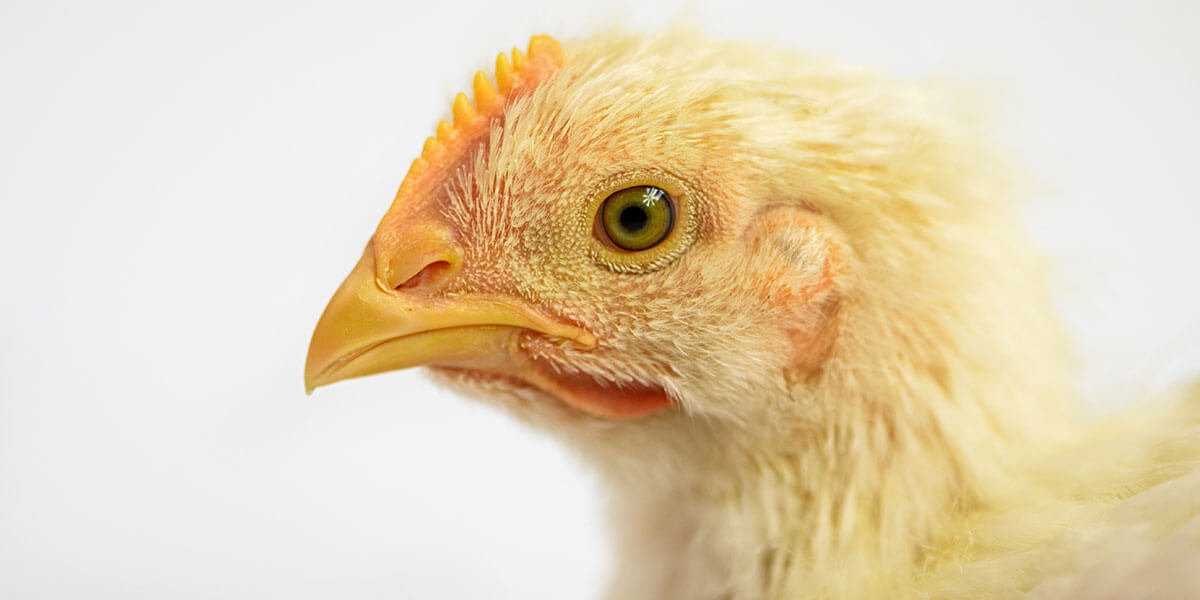Infectious bronchitis virus (IBV) is a common disease in poultry flocks. It targets the upper respiratory tract in chickens and causes severe damage to the epithelium, creating a lasting inflammatory reaction that can divert nutrients away from production factors like growth or reproduction.
IBV is an acute disease and is very contagious. Once IBV enters a poultry flock, it spreads rapidly and typically infects every bird in the flock.
Some of the visual signs of IBV in a poultry flock include coughing, gasping, nasal discharges and ocular discharges. IBV is mostly linked to delayed weight gain but can also be linked to increased mortality when complicated with other bacterial infections. It can also negatively affect reproduction in older birds, who may stop laying eggs because IBV negatively impacts their respiratory tract and their reproductive tract.
Though IBV can have many negative effects on your poultry operation, it can be managed with effective immunization and management strategies and supported with performance trace mineral nutrition.
Infectious Bronchitis Virus Management Strategies
Infectious Bronchitis Virus is widespread throughout the world, and every single poultry operation has it, even if it has not infected the flock. To a certain point, the disease is resistant to its environment, so it can be spread in a variety of ways, such as through infected equipment or through the air.
It’s important to control the disease with proper management strategies, including the following:
- Sanitation: Control the spread of the disease by thoroughly washing and disinfecting your equipment. IBV is susceptible to almost all disinfectants.
- Bio-security measures: Keep visitors out and perform pest and rodent control. Prevent free-flying birds from getting into the houses because, even if they aren’t infected, they can carry the disease and infect your poultry flock.
- Early vaccination: The lifecycle of a breeder is short, and there is little room for error. IBV affects breeders very early in life, so it’s important to start vaccinations early. Most of the time, birds are vaccinated in the hatchery, but it’s also important to vaccinate breeders so that chicks receive some maternal protection against IBV.
- Control of other diseases: IBV is not necessarily a severe infection on its own, but it can lead to higher mortality rates when combined with other bacteria like Mycoplasmas (Mg, Ms) or E. coli.
- Climate control: Maintain a comfortable temperature and proper ventilation in the house to reduce stress. This will keep birds healthy and improve their ability to mount a rapid and robust immune response to infections like IBV.
Performance Trace Minerals Help to Manage Infectious Bronchitis Virus
Infectious bronchitis virus can hinder production performance and, in the presence of other bacteria and infections, can increase mortality in poultry flocks. By implementing effective management strategies and including Zinpro Performance Minerals® in their poultry nutrition programs, poultry producers can mitigate the negative effects of IBV.
Performance trace minerals help birds mount a rapid and robust immune response during an infectious challenge, like IBV.
Zinc helps strengthen epithelial cells and tight junctions in the upper respiratory tract, helping to keep pathogens out. Manganese helps with mucus production and improves the function of the phagocytes, which capture and neutralize harmful bacteria.
One research study, conducted by researchers at the University of Delaware in coordination with Zinpro, evaluated if an IBV infection could be controlled by including Availa® Zn in poultry nutrition programs at two different levels. In this study, 90 non-vaccinated female Ross-708 broilers were assigned to one of nine treatments where they were fed one of three dietary treatments and exposed to one of three IBV challenges.
The dietary treatments included the following:
- Sulfate: 80 ppm of zinc from zinc sulfate
- Availa-Zn Iso: 40 ppm zinc from Availa-Zn and 40 ppm zinc from zinc sulfate
- Availa-Zn High: 60 ppm zinc from Availa-Zn and 40 ppm zinc from zinc sulfate
All of the birds were then given an IBV challenge (negative, direct or indirect) at 10 days of age and underwent an observation period for the remainder of the experiment. Clinical (prevalence of conjunctivitis, nasal discharge and coughing) and pathological (airsacculitis) signs, virus shedding (rRT-PCR) and average daily gain were evaluated for 10 days post-infection. Broilers fed Availa-Zn (Iso and High) were better able to maintain growth rates after facing an IBV challenge compared to birds fed zinc sulfate. Broilers fed 40 ppm of Availa-Zn saw an increase of nearly 11 percent in average daily gain while those fed 60 ppm of Availa-Zn saw a 6 percent increase in average daily gain over broilers fed zinc sulfate during the IBV challenge.

While broilers fed Availa-Zn (Iso and High) had increased prevalence of early clinical inflammatory signs like conjunctivitis, nasal discharge and coughing, we believe this helped to reduce the incidence of airsacculitis, a condition in which the trachea cannot stop bacteria from spreading to the bird’s air sacs and causing an infection and inflammation.
Normal upper respiratory epithelium protection, in reaction to a respiratory infection, produces mucus and secretions together with inflammation. The mechanical expulsion by cilia and coughing block the infection from entering the lower respiratory tract. Birds fed zinc sulfate had an airsacculitis incidence rate of 40 percent while birds fed iso levels of Availa-Zn had an incidence rate of only 10 percent and those fed high levels of Availa-Zn exhibited no incidence of airsacculitis.
Additionally, indirectly infected birds fed the Availa-Zn High treatment had decreased shedding of IBV when compared to the other treatments, indicating the potential for reducing the transmission of IBV.

Overall, the study showed that Availa-Zn assists in the prevention of an IBV infection and limits the virus’s ability to spread from flock to flock. To learn more about including Availa-Zn in your poultry nutrition program, read this research summary or contact your Zinpro representative today.

